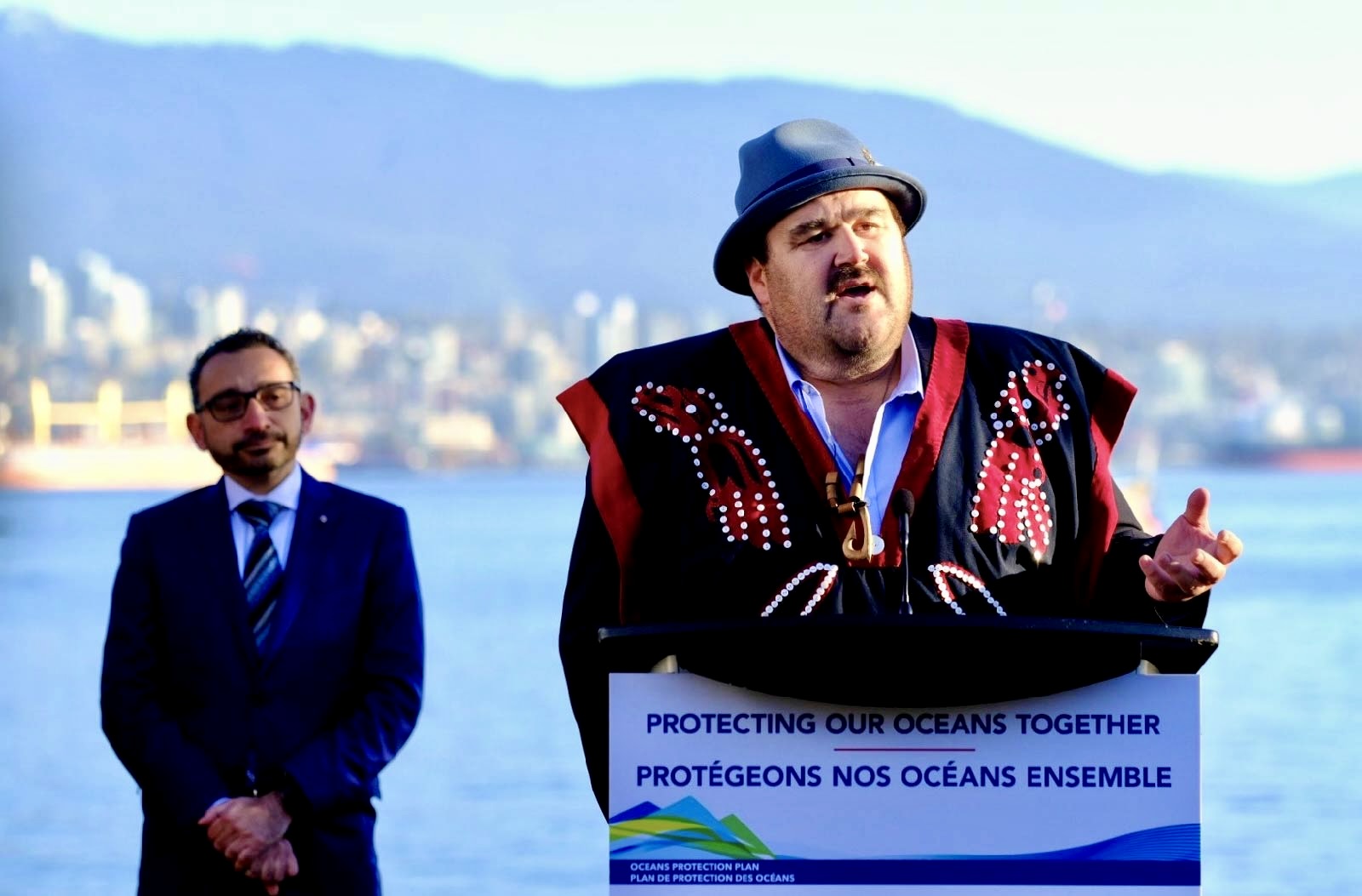Chief Marilyn Slett of the Heiltsuk Nation, speaks about the continuing importance of Indigenous Partnerships in the Oceans Protection plan. By her side is Louisa Housty-Jones, a member and Councillor for the Heiltsuk Nation.
Friday, November 18, 2022, was a cool crisp fall morning. At HMCS Discovery—a naval reserve base nestled between Coal Harbour and Stanley Park in Vancouver—reconciliation and collaboration were front and center as Minister Omar Alghabra, Minister Joyce Murray and Minister Jonathan Wilkinson, along with Chief Marilyn Slett of the Heiltsuk Nation, and Dallas Smith, president of Nanwakolas Council and co-chair of the Reconciliation Framework Agreement, announced $1.1B in Oceans Protection Plan funding for incident response and prevention, and for partnerships with Indigenous and coastal communities.
More than 60 leaders from the marine response and prevention industry sector, along with Indigenous leaders from the north and south Coast of British Columbia, gathered to support this announcement.
Chief Marilyn Slett spoke about the continuing importance of Indigenous partnerships in the implementation of the Oceans Protection Plan. “The North Coast is a rich, varied, and fragile part of our natural world. The connection of the land and sea with people has given rise to our ancient Northwest culture,” said Chief Slett.
Emphasizing the hard work that has been accomplished via the Reconciliation Framework Agreement for Bioregional Oceans Management and Protection (PDF, 283 KB), an agreement that supports the collaborative planning, implementation, and integration of existing and proposed marine planning initiatives in the Northern Shelf bioregion, Chief Slett added, “This has been challenging work which has often required federal officials to bring a fresh lens to looking at the issues we are working on together. I think both sides have learned a lot through this experience. Most importantly we’ve built a respectful relationship and ability to listen and act in a progressive and pragmatic manner to advance oceans protection.”
High on Chief Slett’s list of mentions was the creation of the Heiltsuk’s Marine Emergency Response Team.
“After years of relationship-building and the development of a shared understanding of our community’s plan and vision, I am pleased to report we have now agreed to fully implement and define our Heiltsuk Emergency Response Team.” This was made possible through the Canadian Coast Guard’s funding of $5 million to support this development.
To close the event, Mr. Smith then took to the mic to speak about the importance of continued open, frank, and meaningful discussions between Indigenous Peoples and the Government of Canada, noting that though some discussions may be difficult, when done from a place of respect, they can result in significant positive steps forward for all involved, to the benefit of all Canadians.
Mr. Smith said, “The work that Indigenous communities are doing in collaboration with the federal government is the only way forward when it comes to ocean protection and meaningful management. We work at a technical, bureaucratic, and political level in this process together.” He added that a collaborative relationship between governments and Indigenous communities also adds to a much larger picture of reconciliation. “It’s really important to understand how hard it is to put aside some of those societal issues to continue to do the collaborative work that’s necessary.”
“But then I realize we’re not really putting it aside, that’s what’s driving us. It’s because of the inequities that are existing in First Nations communities today that our leadership is pushing forward. And we’re so grateful that the government of Canada has reached out back to us and we’re in that discussion now. We have a relationship.”
“And so that’s how reconciliation really happens.”

